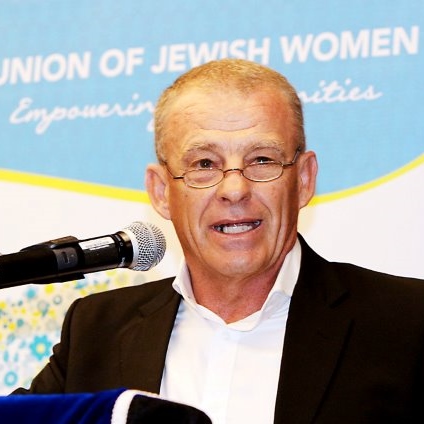click to dowload our latest edition
CLICK HERE TO SUBSCRIBE TO OUR NEWSLETTER


Published
7 years agoon
By
adminSUZANNE BELLING
Entering the Johannesburg Holocaust and Genocide Centre to deliver his keynote address at the Union of Jewish Women’s 31st national conference on Sunday evening, Nel was greeted with near popstar acclaim as one of the most celebrated legal personalities in South Africa.
People were clamouring to meet him and obtain an insight to the incisive mind which led to the convictions of former Police Commissioner Jackie Selebi and disgraced blade runner Oscar Pistorius.
Regarding corruption, he listed four requirements to counteract it: “a strong political will, an efficient and corruption-free judiciary, a free press and an independent and active civil society.
“South Africa is fortunate enough to have three of these four points,” he said.
Political will was the missing element, which was demonstrated from the President (Jacob Zuma) down.
“What is going on in our courts is brilliant,” he said, citing several examples from the Constitutional Court down.
“Is there anyone here today who would have thought 10 years ago that the Nkandla judgment would have been possible?” he asked.
Last week the Supreme Court of Appeal dismissed an appeal against a High Court judgment that set aside the 2009 decision of the National Prosecuting Authority not to proceed with the prosecution of President Jacob Zuma on hundreds of fraud charges. Both courts held that the 2009 decision was irrational and unlawful.
The amount of reporting on corruption indicated a free press. “We had lots of corruption before ’94, but we didn’t read about it,” he said. The wide publicity of the Gupta leaks was just one instance of recent press revelations and investigations.
Civil society was also playing a major part. The Helen Suzman Foundation, AfriForum and others, were in the forefront of action to expose and condemn corruption, often going to court in an attempt to stop it in specific cases.
But there were always at least two parties involved in corrupt activities. The problem was not just corrupt government officials.
He quoted a speech by Public Service and Administration Minister Faith Muthambi, in which she said: “For every corrupt public servant there must be a corrupt businessman.”
Many in business condemned corruption, but when they went back to their boardrooms, the situation was no longer so clear.
Ensuring integrity among both public servants and businesspeople was among the requirements for stopping corruption. Individual integrity and honesty played a significant role as well.
Asking people whether they were willing to do anything they could to stop corruption, the response was often, “Yes!”
But the moral issue among private individuals was highlighted by the willingness of some people – including those who proclaimed themselves firm opponents of corruption – to pay several hundred rand to a policeman to avoid a formal fine or prosecution for a traffic offence.
“A R500 bribe to cops is the same corruption as Nkandla or Eskom,” Nel said.
Another requirement, covering all four areas, was that “we had to have moral leadership”.
According to Nel, “we overcomplicate corruption”, although it was easy to understand.
The essential question with regard to corruption was simply whether a public servant would be enticed by a reward to do something that was beyond his or her normal duty. The law no longer required proof of bribery, because the elements of the offence were often difficult, if not impossible, to prove.
Nel retired from his lifelong career as a litigating prosecutor to move into the relatively unknown field of private prosecutions under the auspices of the NGO AfriForum.
Before accepting the AfriForum offer, he had set three conditions: “I would be independent; I could pick the cases I believe in; and I would need resources to develop the law.”
AfriForum accepted the first two and undertook to help provide the relevant resources.
Nel explained how private prosecutions operated. “One can only institute a private prosecution when the National Prosecuting Authority has decided not to prosecute. They are not a parallel stream. We would ask for a nolle prosequi certificate from the NPA”, indicating it was not going to prosecute.
“We would tell them we believe there is merit in the prosecution.
“If we then start the prosecution and are doing well, they are obliged to take over from us. We have to guarantee the costs of the defendant, but, if we win, the NPA pays all our costs.”
Nel insisted that a political motivation for a private prosecution was “impossible”, as it depended solely on the merits of the case.
In addition, “we have to show we have a substantial interest in the prosecution”.
Nel was looking forward to developing this area of the law in his new post.
